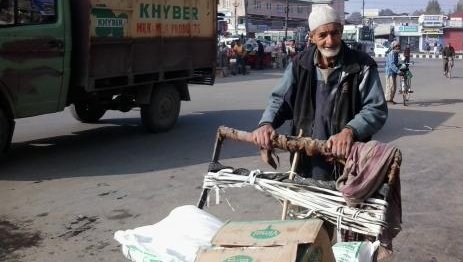SRINAGAR, India (GPI)-- Abdul Rashid Hajam, 65, smiles like a child when he remembers receiving his first payment for a day’s labor as a 10-year-old at one of the largest wholesale markets in Srinagar, Kashmir’s summer capital. The wage, 12 aanas, copper coins no longer in use, equates to less than 1 Indian rupee (2 cents). “That was a long time ago, when I first came to Srinagar city for work,” Hajam says. Originally from a village in the Budgam district, he says the hilly, infertile land prompted him to pursue work in the capital as a youth. “Not much grows,” he says of the land in his village. “We try to grow maize or rice, but the produce is little. This year, we had planted rice, but it failed due to cold.” With few opportunities to earn a living in the village, Hajam relies on his earnings in Srinagar, where he rents a place to stay. He has been working as a laborer in the Sarai Bala market for 55 years. Sarai Bala is a series of shops crisscrossing the narrow lanes in the center of Srinagar. A busy hub mainly for textile merchants, the shops sell bales of cloth. Store windows display the colorful, embroidered material for sale. Outside the shops, huge parcels of goods wait to be unloaded from trucks and transferred to warehouses known as “godowns.” Laborers are needed to unload these goods as well as load them into new trucks after the traders make sales to retailers. Hajam makes his living loading and unloading the trucks on a freelance basis. He says there are currently 10 to 20 laborers from his area working in the market because of a lack of employment opportunities back home. “I manage to earn 100 ($2) to 150 rupees ($3) per day,” he says. “I make 2,500 ($30) to 3,000 rupees ($45) every month, out of which 1,000 rupees ($20) are spent on food, rent and other expenses.” Hajam says he prefers the flexibility of working as a freelance laborer. Although Sunday is his only day off, he can manage his work schedule so he can rest when he needs to. “Even while working, if I feel my health isn’t right, I go back to my accommodation for rest,” Hajam says, adding that this wouldn’t be possible if he worked for an employer full time. He says that he can’t work full days because of his health as he gets older. But he will continue working because he doesn’t like to be dependent on anyone, even his children. “In this work, I get the money in my hand,” he says. Population growth and industrialization have prompted men from rural areas of Kashmir to migrate to cities for work. Freelance laborers can earn stronger wages in urban textile markets and enjoy flexible schedules, but they and even salaried employees at smaller shops lack access to benefits and protection under labor laws. Employers say even fellow employers required to provide benefits don’t always follow the law and that few laborers know their rights. Labor officials say the government can only guarantee benefits to organized sectors. Those in the textile industry encourage laborers to form unions in order to protect and expand their rights. Approximately 8 percent of Kashmir’s urban population lives below the poverty line, according to the Below Poverty Line Survey of 2008, conducted by the Directorate of Economics and Statistics under the Planning and Development Department of the Jammu and Kashmir state government. In rural areas, it’s more than three times higher, at 26 percent.
Advertisement















